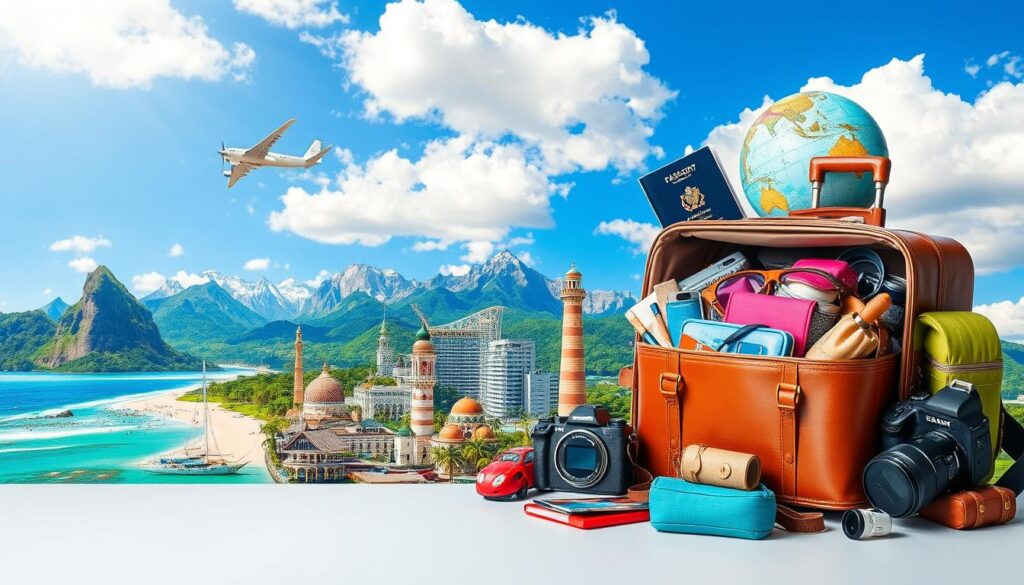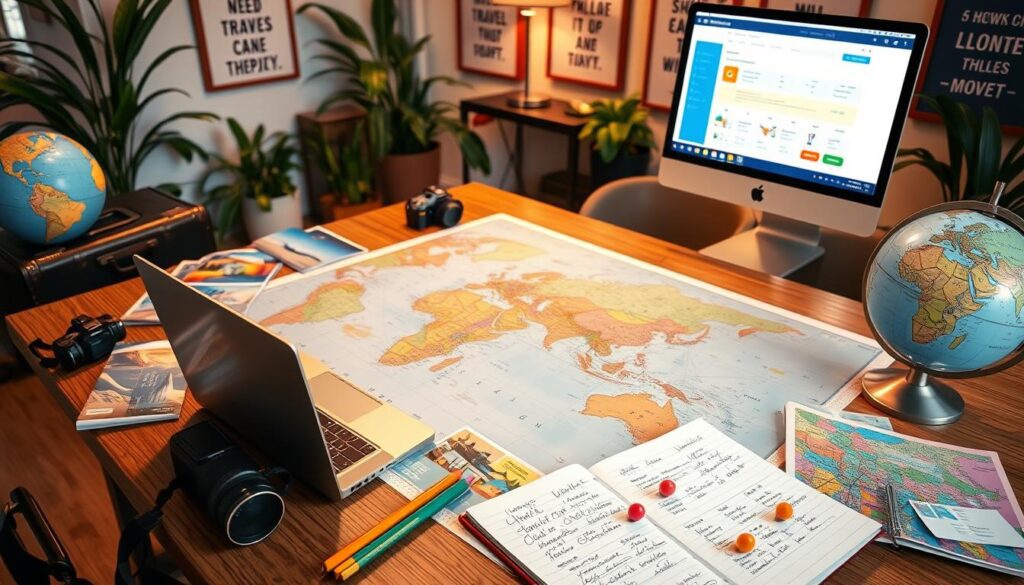
As I looked out the window, I dreamed of adventures beyond my home. I longed to explore new cultures and landscapes. But planning a perfect vacation seemed overwhelming, until I found the secrets of trip planning.
In this article, I’ll show you how to plan your dream trip. We’ll cover setting your travel goals, budgeting, and picking the right destination. I’ll share tips for a memorable journey, whether you want to relax or seek adventure. Let’s start planning your dream vacation.
Key Takeaways
- Unlock the secrets to seamless trip planning and turn your vacation fantasies into a reality.
- Discover expert tips to define your travel objectives, budget for your dream getaway, and choose the perfect destination.
- Learn how to create an unforgettable itinerary that balances structured and unstructured time, ensuring a truly immersive experience.
- Overcome planning inertia and maximize your travel experience, whether you’re craving relaxation or adventure.
- Explore the best digital tools and resources to streamline your trip planning process and make the most of your vacation.
Understanding Your Trip Planning Goals
Planning your dream vacation starts with knowing what you want. Do you want to relax and unwind, or seek adventure? Maybe you want to dive into a new culture or see nature’s wonders. Knowing your goals helps you pick the right place and plan your trip.
Defining Your Travel Objectives
Think about what you want from your trip. Do you want to relax, or try new things? Clearly defining your goals helps make your trip fulfilling.
Aligning your trip with your desires makes it transformative. It leaves you feeling refreshed and inspired. Take your time to plan with purpose and explore your dreams.
“The journey of a thousand miles begins with a single step.” – Lao Tzu
This quote shows that big goals can be reached step by step. By setting clear objectives, you’re ready for an amazing trip. It will meet your deepest desires and ambitions.

Unlocking your trip’s potential starts with knowing your goals. Reflect and let your inner explorer lead you to an unforgettable experience.
Budgeting for Your Dream Getaway
Planning the perfect vacation doesn’t have to be expensive. Trips can be affordable with smart planning. First, figure out how much you can spend on travel financing. This way, you can enjoy adventures without worrying about debt.
Think about using your savings or opening a special journey funding account. Being creative can help you save money. For example, traveling during the off-season or house swapping can make your trip cheaper. With some planning, you can have amazing experiences without spending too much.
“When planning a trip, consider saving about $250 a month or $125 per paycheck for a three-day trip to New York City costing approximately $2,000.”
Focus on the experiences you want, not just the cost. Whether you dream of a fancy trip or something more affordable, stay true to your goals. Using all the resources you have will help you plan the perfect vacation.
Choosing the Perfect Destination
With your travel goals and budget set, it’s time to start looking for the perfect vacation spot. Use search engines and travel blogs to find lots of information. This will help you pick a place that fits your interests and what you like.
Think about things like language, money, and travel rules when picking a destination. Don’t just stick to the usual places. Consider trips during the off-season or places that are closer to home. These can be great options for avoiding crowds and saving money.
Researching Potential Destinations
Doing deep research is key to finding the right vacation spot. Look into the culture, nature, and special experiences each place offers. Think about your budget, how long you’ll be there, and what you want to do.
Exploring off-the-beaten-path places can lead to a more real and fun trip. You’ll get to really experience the local culture and traditions.
Whether you love cities, nature, or a mix of both, do your homework. This will help you pick the perfect spot for your dream vacation.
| Travel Style Preferences | Budget Considerations | Popular vs. Off-the-Beaten-Path Destinations |
|---|---|---|
| • Relaxing by the pool • Backpacking in the mountains • Visiting historical and cultural sites • Being in nature • Enjoying city conveniences | • Calculating flight costs to different destinations • Flexibility with travel dates and destinations • Accommodations, food, and activity expenses | • Popularity of tourist destinations and impact on cost and crowd levels • Exploring less popular destinations or off-season travel |

trip planning Logistics
After picking my dream destination, I start planning the practical parts of my trip. This means booking flights, hotels, and transport. I also check visa and entry rules, and COVID-19 rules in my destination.
Planning these details is key for a smooth trip. For example, I’ll figure out how to get around. Will I rent a car, use public transport, or get rideshares? By planning well, I can avoid problems and enjoy my vacation more.
| Logistical Considerations | Tips and Recommendations |
|---|---|
| Passports and Visas |
|
| COVID-19 Protocols |
|
| Transportation |
|
| Accommodations |
|
| Travel Insurance |
|
By planning these trip planning logistics carefully, I can make my vacation organization and journey coordination successful. Whether it’s planning an adventure mapping or excursion preparation, staying organized is key. This helps in setting up a great getaway setup and holiday planning.

Creating an Itinerary
Now that the basics are covered, it’s time to dive into trip itinerary planning. This is where the real fun starts! It’s all about finding the right mix of planned activities and free time for surprises.
Start by adventure mapping and looking up top sights and hidden spots. Mix these into a plan that’s both solid and flexible. Don’t forget to include time for rest and relaxation. Too much packed into your excursion scheduling can make you tired and miss out on the best parts.
Balancing Structured and Unstructured Time
Creating a daily tour timetabling helps make your vacation unforgettable and refreshing. Use travel management tools to sketch out your itinerary layout. Sites like Workaway let you live with locals and help out, offering a chance to explore freely.
It’s key to include downtime in your travel schedule crafting to avoid getting too tired. Keep some days open for spontaneity or to change plans if needed. This makes your journey timeline designing more enjoyable and adaptable.
Conclusion
By following these expert trip planning tips, you’re on your way to a dream vacation. Stay flexible, enjoy the unexpected, and most importantly, have fun. With good planning and a positive attitude, your trip will be unforgettable. So, start planning your next big adventure today!
In over 20 years of trip planning for Alaska, I’ve learned a lot. Reading reviews is key to making smart choices. Prices for tours and activities in Alaska vary a lot. It’s important to spend your money wisely, based on what others say.
Good vacation organizing means knowing who you’re planning for. Things like age and where people are from matter a lot. Surveys help you understand what tourists want. Make sure activities are safe for everyone and support local places and people.
FAQ
What are the key steps in planning a dream vacation?
Planning a dream vacation involves several steps. First, define your travel goals. Then, set a budget and decide on your time frame. Next, research and pick the perfect destination.
After that, book your flights and accommodations. Finally, create a travel itinerary that’s both fun and flexible.
How do I determine my travel objectives?
To figure out your travel goals, think about what you want from your trip. Do you want to relax or seek adventure? Are you interested in exploring a new culture or enjoying nature?
Knowing your goals will help guide your planning process.
What financial and practical considerations are important when planning a dream vacation?
When planning, consider your budget and vacation time. Set a realistic spending limit and plan your trip within your time frame. Use savings apps and travel during off-peak seasons to save money.
If you have limited vacation days, think about extending long weekends or traveling during shoulder seasons.
How do I research and choose the perfect travel destination?
Start by using search engines and travel blogs to find destinations that match your interests. Look at language, currency, visa requirements, and accessibility. Don’t be afraid to explore off-the-beaten-path destinations.
Shoulder season trips or destinations closer to home can offer great experiences without the crowds and high costs of peak times.
What are the key logistics to handle when planning a trip?
Key logistics include booking flights, accommodations, and transportation. Research visa and entry requirements, as well as COVID-19 protocols. Carefully planning these details will make your trip smooth and stress-free.
How do I create an engaging yet flexible travel itinerary?
Create a travel itinerary that balances planned activities and free time. Research must-see sights and unique experiences. Then, mix them into a schedule that’s both structured and flexible.
Remember to include time for rest and relaxation to avoid burnout.
Recent Post
Plan Your Dream Vacation: Trip Planning Made
- October 15, 2024
- 8 min read
Creating the Perfect Travel Itinerary | Plan
- October 15, 2024
- 8 min read
Top 10 Best Vacation Spots in May
- October 15, 2024
- 8 min read







